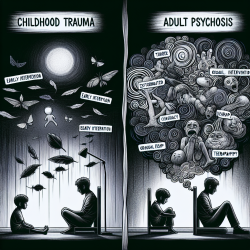Understanding the Complex Relationship Between Childhood Trauma and Personality Pathology
Childhood sexual abuse (CSA) is a deeply traumatic experience that can have profound effects on an individual's personality development. A recent study titled Personality Pathology among Adults with History of Childhood Sexual Abuse: Study of the Relevance of DSM-5 Proposed Traits and Psychobiological Features of Temperament and Character sheds light on the intricate links between CSA and personality disorders.
Key Findings from the Study
The study utilized the Personality Inventory for DSM-5 (PID-5) and the Temperament and Character Inventory (TCI-125) to assess the personality profiles of individuals with a history of CSA. The findings revealed significant associations between CSA and certain pathological personality traits. Specifically, individuals with a history of CSA exhibited higher levels of antagonism and psychoticism, along with increased emotional lability and perceptual dysregulation.
Furthermore, the study found that CSA victims showed lower levels of self-directedness and cooperativeness, which are crucial for healthy social interactions and self-regulation. These insights highlight the importance of understanding the unique personality profiles of CSA survivors to provide tailored therapeutic interventions.
Implications for Practitioners
For practitioners working with CSA survivors, these findings underscore the need for a nuanced approach to therapy. Here are some strategies to consider:
- Personalized Interventions: Utilize personality assessments like PID-5 and TCI-125 to tailor interventions that address specific pathological traits.
- Focus on Self-Regulation: Develop therapeutic strategies that enhance self-directedness and cooperativeness, aiding in better social functioning and emotional regulation.
- Trauma-Informed Care: Implement trauma-informed practices that recognize the impact of CSA on personality development and provide a safe therapeutic environment.
- Continued Education: Stay informed about the latest research and methodologies in personality pathology and trauma therapy through conferences and webinars.
Encouraging Further Research
While this study provides valuable insights, it also opens the door for further research. Practitioners are encouraged to explore the following areas:
- Longitudinal Studies: Conduct long-term studies to understand how personality traits evolve over time in CSA survivors.
- Cultural Influences: Investigate how cultural factors influence the relationship between CSA and personality pathology.
- Intervention Efficacy: Evaluate the effectiveness of different therapeutic interventions in addressing personality pathology in CSA survivors.
To read the original research paper, please follow this link: Personality Pathology among Adults with History of Childhood Sexual Abuse: Study of the Relevance of DSM-5 Proposed Traits and Psychobiological Features of Temperament and Character.










